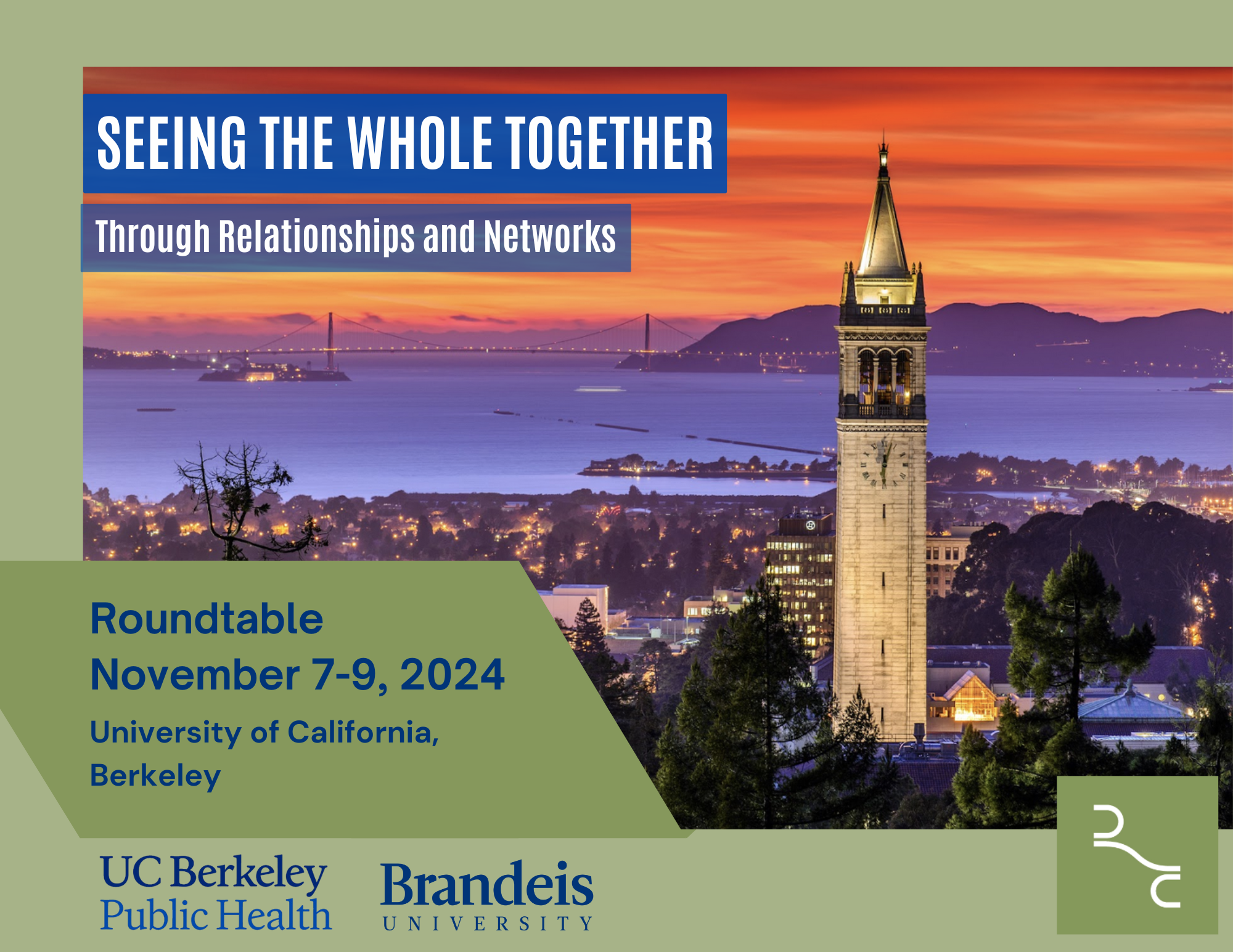
2024 ROUNDTABLE Seeing the Whole Together Through Relationships and Networks
University of California, Berkeley
Keynote Speakers
John Paul Stephens, PhD
Weatherhead School of Management, Case Western Reserve University
Brian Park, MD
Oregon Health & Science University; RELATE Lab
In a world where division and polarization are often the themes of our daily news and experiences, what does it mean to "see the whole" and to do so together? What could this look like and how could we get there in our organizations, communities and societies?
We know the potential that is at stake - by seeing the whole, we can more easily find solutions to complex challenges such as equitable healthcare, inclusive education, community well-being, climate change and world peace. However this is easier said than done, especially for leaders navigating in systems and communities under stress. Come join us to learn how relationally-based theories, methods and practices can help us on our way.
If you are an RCC Member, access the archives with your username and password below.
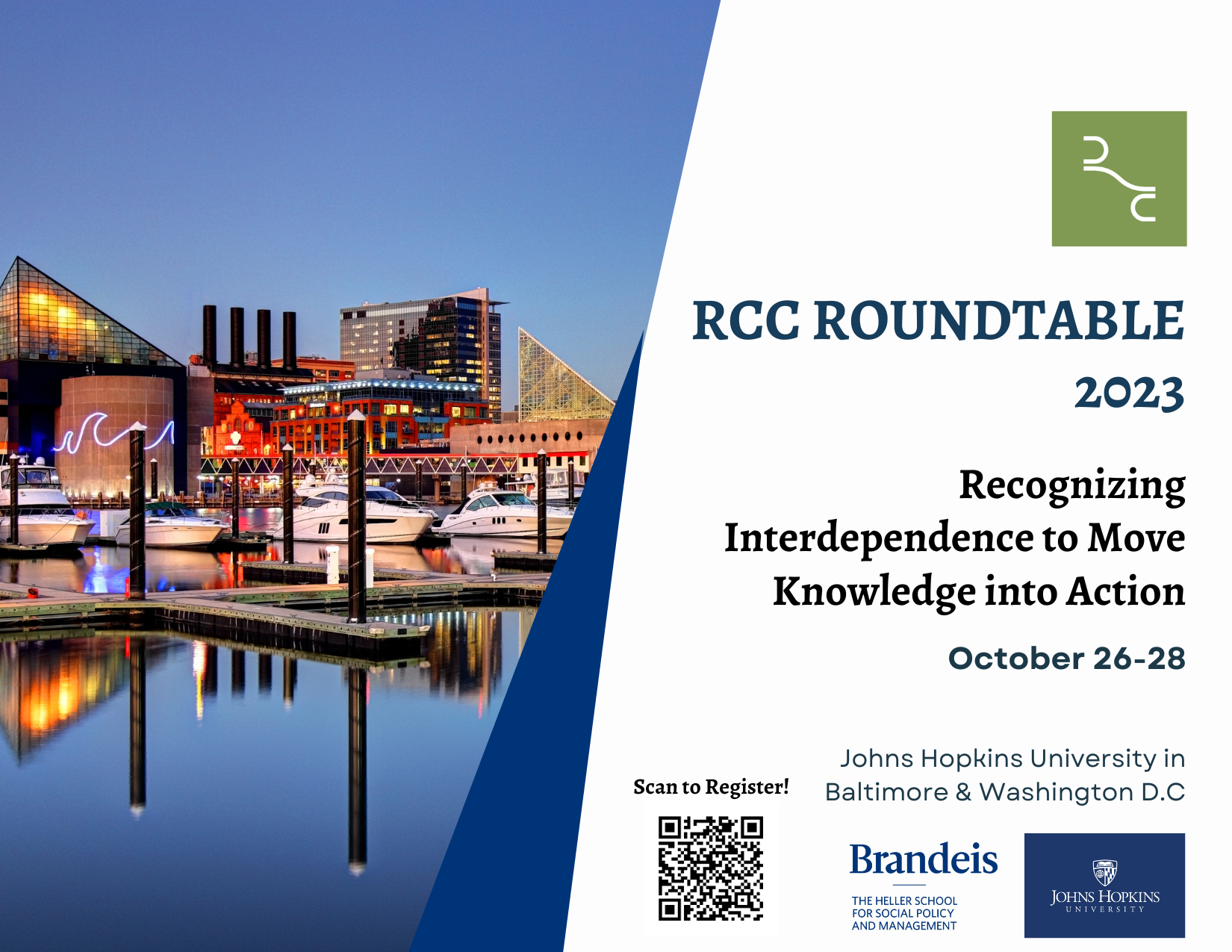
2023 ROUNDTABLE Recognizing Interdependence to Move Knowledge into Action
Johns Hopkins University, Baltimore, MD
Keynote Speakers
Zachary Hylton
Founder, E. LLC., PhD student, Brandeis University
Jean Bartunek
Professor, Boston College
Patrick Lee
System Chair of Medicine, One Brooklyn Health
As human beings in the 21st century, we are facing local and global crises of climate change, hunger, homelessness, violence, hatred, mental illness and hopelessness that are intensifying around the world. Our health and human service workers are struggling to keep up. As interdependence becomes more and more evident, people appear to be rejecting it as a constraint rather than recognizing it as a reality and managing it intentionally. Blaming has become more visible than problem-solving. People are increasingly looking to authoritarian leaders to solve these challenges by force rather than seeking integrative solutions to them.
But our interdependence may be inescapable. As Martin Luther King, Jr. said:
“In a real sense all life is interrelated. [We] are caught in an inescapable network of mutuality, tied in a single garment of destiny. Whatever affects one directly, affects all indirectly. I can never be what I ought to be until you are what you ought to be, and you can never be what you ought to be until I am what I ought to be...This is the inter-related structure of reality.”
Moving from knowledge to action is therefore an ongoing relational process. To make change, we need to engage at multiple levels – as individuals, as members of families and communities, as participants at work, and as participants in multi-organizational ecosystems. If we do it only at home, it won’t work. If we do it only at work, it won’t work. We need to build relationships with multiple stakeholders and be the change we wish to see in a more consistent way.
If you are an RCC Member, access the archives with your username and password below.
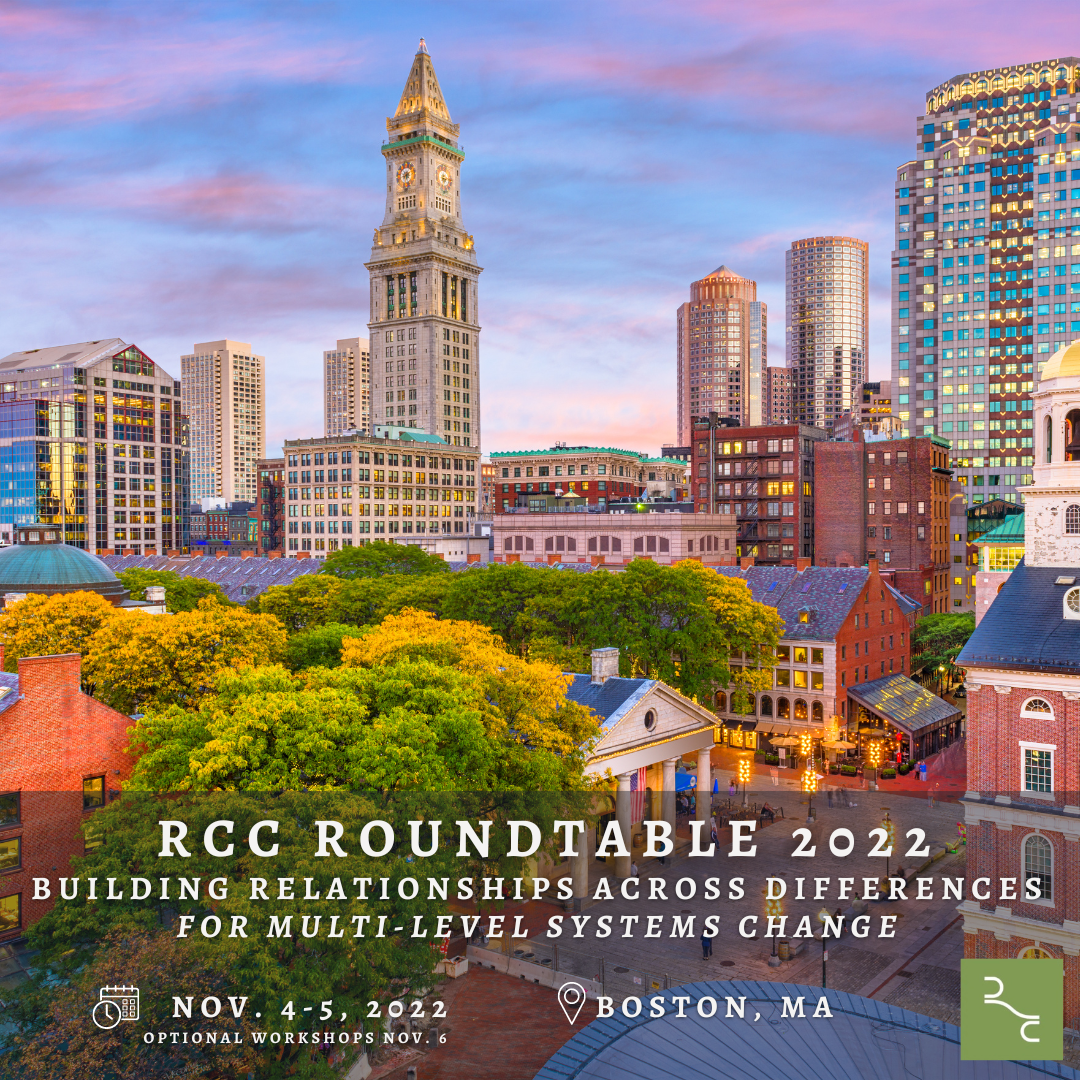
2022 ROUNDTABLE Building Relationships Across Differences for Multi-Level Systems Change
Suffolk University, Boston, MA
Keynote Speakers
Founding Director, KMH
Center for Health Innovation and Entrepreneurship, Babson College
To solve the challenges we face today, multi-level systems change is needed more than ever. At every level of our systems, however, relationships are broken and in need of rebuilding. How can we “flip the narrative” to see our differences as valuable resources for problem solving? How can we leverage the rich information offered by our differences to find systemic solutions and achieve desired outcomes for all participants? What role does leadership play in bridging across these differences?
If you are an RCC Member, access the archives with your username and password below.
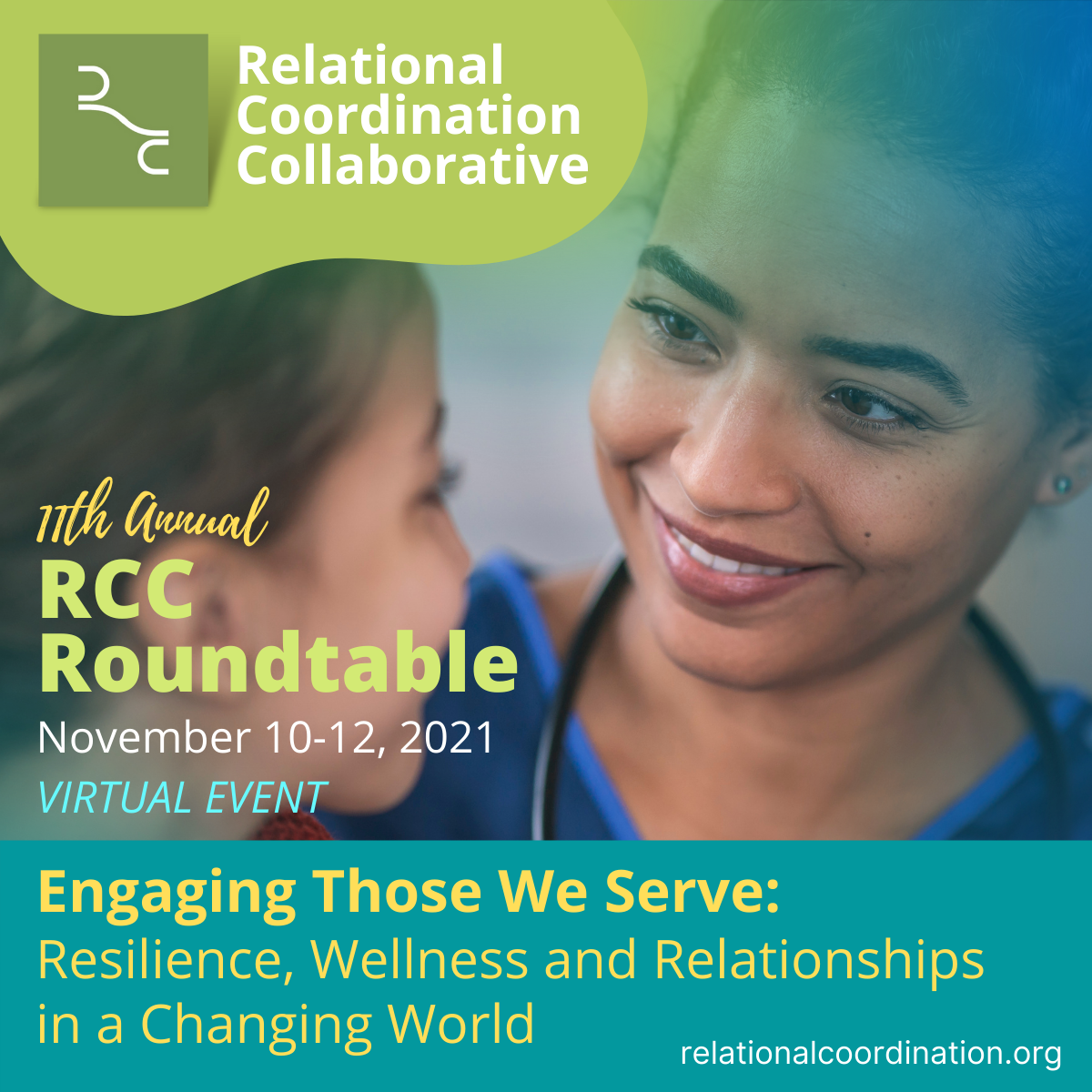
2021 ROUNDTABLE Engaging Those We Serve: Resilience, Wellness and Relationships in a Changing World
Virtual
Keynote Speakers
Dr. Erik Hollnagel
Scientific Director at the Institute of Resilient Systems + (Seoul, South Korea), Visiting Professorial Fellow, Faculty of Medicine and Health Sciences at Macquarie University (Sydney, Australia), Visiting Fellow of the Institute for Advanced Study of the Technische Universitat München (Germany), and Professor Emeritus at the Department of Computer and Information Science (IDA) at Linköping University (LIU), Sweden.
Dr. Edgar Schein and Peter Schein, MBA
Organizational Culture and Leadership Institute
Over the past two years, we have seen both positive and negative change that we never thought possible. As we continue to heal and grow, how can we ensure that voices of community members, clients, patients and families are built into our changing systems? Join us at the virtual 2021 RCC Roundtable where this year's theme is Engaging Those We Serve: Resilience, Wellness and Relationships in a Changing World.
This year's Roundtable will also feature a Relational Coordination Survey Data Lab with Jody Hoffer Gittell, PhD, and Hebatallah Naim Ali, PhD, authors of the new book "Relational Analytics."

2020 ROUNDTABLE Building a Relational Society Through Multi-Level Systems Change
Virtual
Keynote Speakers
Elizabeth Teisberg, PhD
Cullen Trust for Higher Education Distinguished University Chair in Value-Based Care, Dell Medical School and the McCombs School of Business
Rushika Fernandopulle, MD, MPP
CEO and Cofounder, Iora Health
Our well-being at every phase of life is determined by our relationships. Organizations can help to build a relational society by cultivating relational coordination internally and in their communities -- helping to achieve desired outcomes such as well-being, quality, efficiency, profitability and innovation -- for their stakeholders. With the timing of this year's Roundtable, the US election has taken center stage in the world's response to the pandemic, systemic racism, growing inequality and climate change. This is a moment of reckoning. At this important moment, join us to strategize and orient ourselves to the compelling needs of our times. Relational Society is a new idea, providing a framework to address much needed multilevel transformational change. No matter the outcome of the election, there will be much to discuss through the lens of Building a Relational Society.

2019 ROUNDTABLE Designing the Future: The Relational Science of Intentional Change
Catalyst HTI, Denver, Colorado US
Christi Zuber
Founder & Managing Director, Aspen Labs
Executive Director, Innovation Learning Network
David Sloan Wilson
SUNY Distinguished Professor Biology and Anthropology, Binghamton University
Can we get better at creating positive change intentionally, as individuals, organizations, communities, institutions, and countries, through mindful attention to the consequences of our actions? How can we embrace unintended consequences that add value, and better anticipate those that destroy value? To do so is likely to require approaches - such as human-centered design, systems thinking, collective action, and relational coordination - that are inclusive and mindful of interdependence. Roundtable presenters shared how this process works within and between organizations in healthcare, education, community safety and private industry, in the face of growing inequality and deepening divisions.
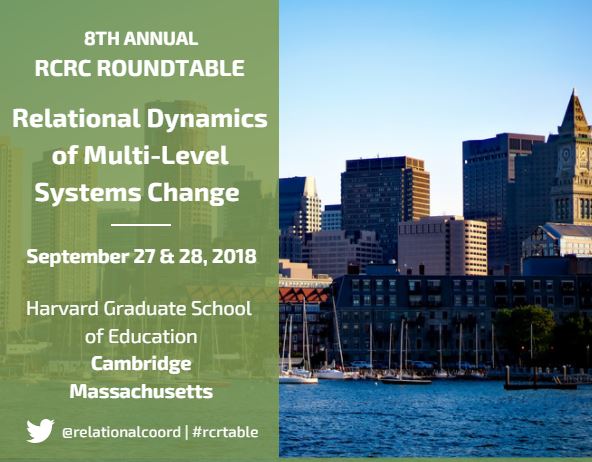
2018 ROUNDTABLE Relational Dynamics of Multi-Level Systems Change
Harvard Graduate School of Education and Boston City Hall
Keynote Speakers
J. Phillip Thompson
Deputy Mayor, Strategic Initiatives, City of New York
Amy Edmondson
Novartis Professor of Leadership and Management, Harvard Business School
At the 8th Annual Roundtable, we will explore systems change in healthcare, in schools and universities, and throughout the public, nonprofit, and private sectors. We will see how to coordinate systems change across multiple levels, from institutional and cross-organizational to cross-functional and interpersonal.
This Roundtable is shaping up to be one of our best ever. Dozens of presenters will share their RC research and practice in interactive formats. Welcoming activities include the world renowned Institute for Healthcare Improvement, a Boston Harbor Cruise, a tour of the John F. Kennedy Library, and a design lab at the Boston Office of Urban Mechanics. The Program on Negotiation at Harvard Law will explore how to integrate principles of RC and negotiation to manage conflict. And colleagues from Beth Israel Deaconess Medical Center will host a patient care redesign lab using lean and RC principles, followed by a tour of nearby Fenway Park, home of the Boston Red Sox. We have two inspiring keynote speakers – Amy Edmondson from Harvard Business School will share how teaming can work across multiple levels to achieve coordinated systems change, and Phil Thompson from MIT and the NYC Mayor’s Office will talk about using social movements to reinvigorate the economy and how work is done. Another highlight is a Friday afternoon panel on Leading and Supporting RC Change from the C-Suite. Leading up to the Roundtable we will offer a new training called Advanced Methods for Improving Relational Coordination: A Toolkit for Leaders and Facilitators.
It all starts with “being the change you wish to see in the world.” Whether it’s your first time or you’ve participated every year, join us as we leverage relational coordination, social movements and teaming as methods to create and sustain systems change.
Host Committee
Jean Bartunek (Boston College), Brenda Bond (Suffolk University), Joel Cutcher-Gershenfeld (Brandeis University), Anne Douglass (UMASS Boston), Amy Edmondson (Harvard Business School), Tina Foster and Marjorie Godfrey (Dartmouth Institute Microsystem Academy), Lynn Garvin (Boston University/Veterans Administration Boston), Jody Hoffer Gittell and Tanya Allain (RCRC), Donald Goldmann (Harvard School of Medicine/IHI), Monica Higgins (Harvard Graduate School of Education), Thomas Kochan (MIT Sloan School of Management), Kimberly Lucas (Mayor's Office of New Urban Mechanics), Saleema Moore (RC Analytics), Rajesh Sampath (Brandeis University) and Julius Jong Yang (Beth Israel Deaconess Medical Center)
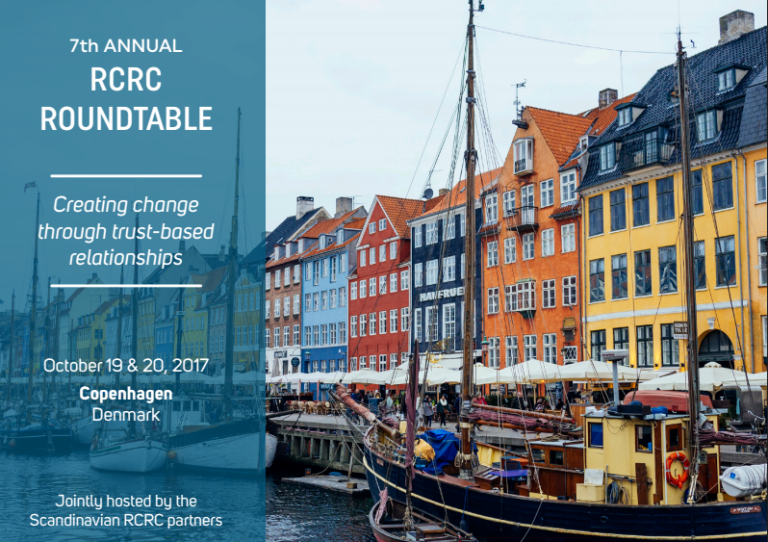
2017 ROUNDTABLE Creating Change Through Trust-Based Relationships
The Metropolitan University College, Copenhagen, Denmark
Keynote Speakers
Michele Williams
Professor, University of Iowa
Edgar Schein
Professor Emeritus, MIT Sloan School of Management
The world as we know it has been undergoing dramatic changes. A populist groundswell is building up, nurturing a feeling of an ‘us’ versus ‘them.’ Political, sociological and economic changes are raising the level of insecurity for both public organizations and private companies. How do we create trust in a time of distrust? How do we build relational coordination between professions, across organizations, across differences in gender, race, nationality and status, and between managers, employees, investors and clients, to achieve our desired outcomes? The RCRC community has a deep expertise in using relational coordination to support healthcare improvement, with a growing focus on relational co-production with citizens and families. Building on this expertise, our partners are now using relational coordination to support community wellness, social change, education, human services, construction, transportation, sustainable supply chains, entrepreneurial ventures, and more.
At the 7th Annual Roundtable, you will see the world from a different perspective. Literally! For the first time, the Roundtable is taking place outside the U.S. Our location this year will be Copenhagen, the capital of Denmark and one of the major cities in Scandinavia. The Scandinavian countries have been characterized by high levels of trust among citizens, in the judicial system, and even in politicians.
Join us for inspiration from around the world, as we bridge our research and practical experiences to create change. We invite you to bring your research, or teaching or a change initiative you’re involved with and put your head together with fellow researchers and professionals to deepen your knowledge and bring new perspectives to it. You will have a chance to explore Copenhagen and local organizations that have implemented relational coordination. We can walk-the-talk as we connect between research and practice, and across professions, industries, cultures and nations.
Host Committee
Søren Bjerregaard Kjær (Team Working Life), Carsten Hornstrup (Joint Action), Jody Hoffer Gittell, Tanya Allain and Lauren Hajjar (RCRC)
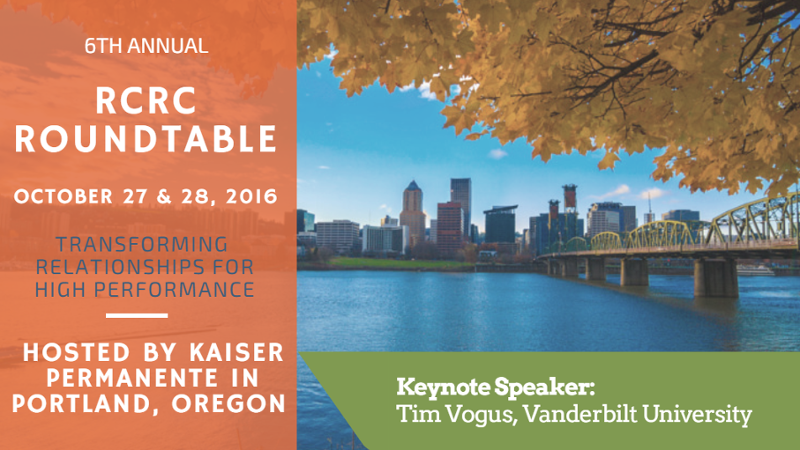
2016 ROUNDTABLE Transforming Relationships for High Performance
Kaiser Permanente Northwest, Portland, Oregon US
Keynote Speaker
Timothy Vogus
Professor, Vanderbilt University
Organizations around the world are facing intense pressures for transformation, increasing the potential for conflict as well as lost employee engagement and lost productivity. Meanwhile, we know that positive relationships enable resilience under pressure. How do we address this dilemma? Join us at the 6th Annual RCRC Roundtable as we share breakthroughs in the research and practice of relational coordination. We will learn how organizations around the world are choosing relational responses to performance pressures. By harnessing conflict for learning, they are seeking to avoid downward spirals and build positive spirals in their place. Our host is Kaiser Permanente, a highly innovative US health system ready to share its stories of practice transformation.
Host Committee
Joan Resnick and Eliana Temkin (Kaiser Permanente Northwest), Kathryn McDonald (Stanford Health Policy), Joanne Beswick and Jody Hoffer Gittell (Heller School, Brandeis University), Brenda Zierler (University of Washington)

2015 ROUNDTABLE Healthy and Thriving Workplaces and Communities - The Role of Relational Coordination
New York University's Robert F. Wagner Graduate School of Public Service, New York, NY US
Keynote Speaker
Kathryn Ruscitto
CEO, St. Joseph's Health System
We have so much to learn from each other as we navigate the movement from piece rate healthcare to a more comprehensive, systemic approach that addresses the underlying social determinants of health. Just three years ago these words - social determinants of health - sounded strange to many of us. Now they are familiar and evocative of a more promising, more integrated and holistic way of achieving health and human well-being.
This movement represents a paradigm shift. To pull it off in practice requires a greater attentiveness to relationships. It requires a redesign of key roles in our social system and how they relate to one another, and how the people within these roles relate to one another. This new paradigm also involves changes in how the parts of the system relate to one another. There is a greater premium placed on going upstream to address rampant inequality and to invest in well-being at work and in the community.
At this Roundtable we will explore how the theory and practice of relational coordination - coordinating work through relationships of shared goals, shared knowledge and mutual respect - contribute to this paradigm shift. We will explore how relational coproduction by patients and clients and students and citizens - and relational leadership by our leaders - further contribute to this paradigm shift.
Host Committee
Erica Foldy (NYU Wagner), Marcia Mayfield and Susan Wasstrom (1199 SEIU/League Labor Management Project), Michele Williams (Cornell University) & Deborah Friedman (New York City Mayor's Office of Labor Relations)
